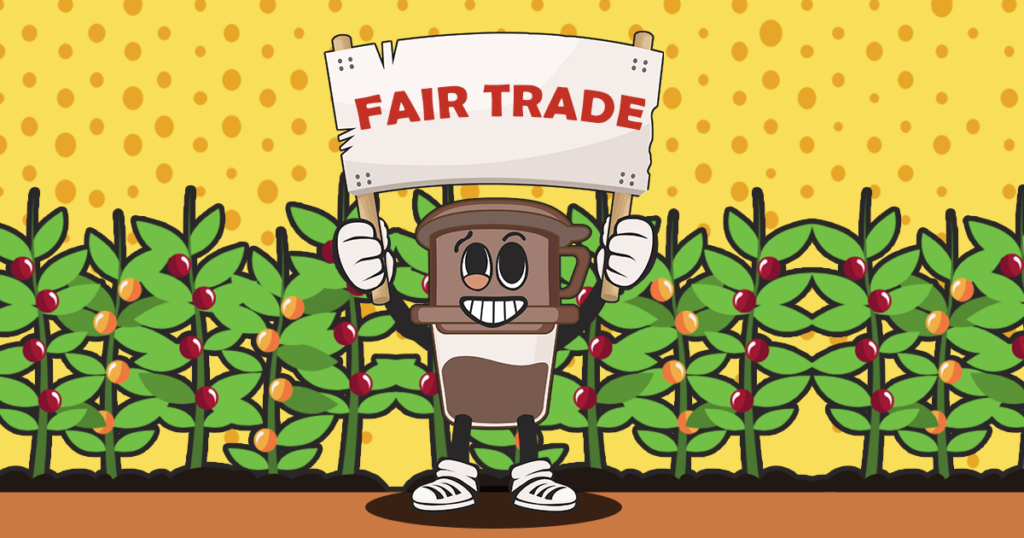Coffee is a daily staple for millions, but have you ever wondered about the story behind your morning cup? Who grows the beans, and how do they get from the farm to your favorite mug? The journey from farm to cup involves many hands, and that’s where fair trade comes in. Here’s why fair trade coffee matters and how it makes a difference:
1. Fair Wages for Farmers
Fairtrade ensures that coffee farmers, many of whom live in developing countries, are paid a fair and stable price for their crops. This is crucial because traditional coffee trading can be volatile, leaving farmers vulnerable to fluctuating market prices. Fair trade guarantees they earn enough to cover production costs and support their families.
2. Better Working Conditions
Workers on coffee farms often face tough conditions. Fair trade certification requires that farmers and workers are treated with dignity, respect, and fairness. This means safer working environments, the elimination of exploitative practices, and better opportunities for workers to improve their quality of life.
3. Environmental Sustainability
Fair trade is not just about people; it’s also about the planet. The certification promotes environmentally friendly farming practices, including reducing the use of harmful chemicals and encouraging organic growing methods. This helps protect ecosystems, promote biodiversity, and maintain healthy soils, ensuring that coffee production is sustainable for future generations.
4. Supporting Communities
Fair trade premiums go beyond the farm and directly benefit entire communities. These additional funds are often invested in local development projects, such as building schools, improving healthcare services, or upgrading essential infrastructure like roads and clean water systems. By buying fair trade, you’re contributing to the betterment of entire regions.
5. Empowering Consumers
When you choose fair trade coffee, you’re making a conscious decision to support ethical business practices. It’s about more than just enjoying a great cup of coffee; it’s about knowing that your purchase helps foster a system that respects both people and the environment.
Mapping the Origins of Fair Trade Coffee
Delving into the origins of Fair Trade coffee offers a deeper understanding of its global significance. Take Peru, for example, a country that has emerged as a powerhouse in the coffee industry. As one of the world’s top coffee exporters, Peru’s coffee exports reached an impressive $60 million in 2020, solidifying its position as the largest exporter of Fair Trade certified coffee globally. The country’s focus on ethical and sustainable farming has not only strengthened its coffee sector but has also empowered countless farmers, allowing them to thrive in a volatile global market.
In Ethiopia, coffee represents much more than a cash crop — it’s woven into the very fabric of society. Often referred to as the birthplace of coffee, Ethiopia relies heavily on coffee for economic stability. Coffee accounts for 35% of the nation’s total export revenues, with over 4.2 million smallholder farmers depending on it for their livelihoods. For these farmers, the Fair Trade movement is not just beneficial; it’s essential. By ensuring that they receive a fair price for their beans, Fair Trade safeguards their ability to sustain their families and communities, while promoting responsible agricultural practices.
Exploring the origins of Fair Trade coffee in countries like Peru and Ethiopia highlights the critical role the movement plays in protecting farmers, strengthening local economies, and fostering sustainable development. Each cup of Fair Trade coffee tells a story of hard work, dedication, and the global efforts to create a more equitable coffee industry.
The Benefits of Choosing Fair Trade Certified Coffee
When you opt for fair trade-certified coffee, you’re doing more than just making an ethical purchase. Fairtrade coffee often comes from smaller farms where farmers focus on producing high-quality beans using sustainable methods, which results in better-tasting, more flavorful coffee. Additionally, fair trade certification ensures greater transparency, allowing you to trace your coffee back to the co-op or region where it was grown, providing peace of mind that it comes from ethical sources. By choosing fair trade, you’re contributing to a fairer global economy, supporting farmers with fair wages and working conditions, and helping bridge the gap between developed and developing countries. For those who prioritize sustainability, social justice, and supporting small-scale farmers, fair trade aligns perfectly with these values, making it an easy way to make a positive impact with something as simple as your coffee choice. So, next time you’re browsing the coffee aisle, consider reaching for the fair trade certified option — with every sip, you’re not only enjoying great coffee but also supporting a movement for change.
In a nutshell, fair trade coffee is important because it helps build a better future for farmers, their families, and the planet. So, the next time you brew a cup, think about the impact your choice can make.

